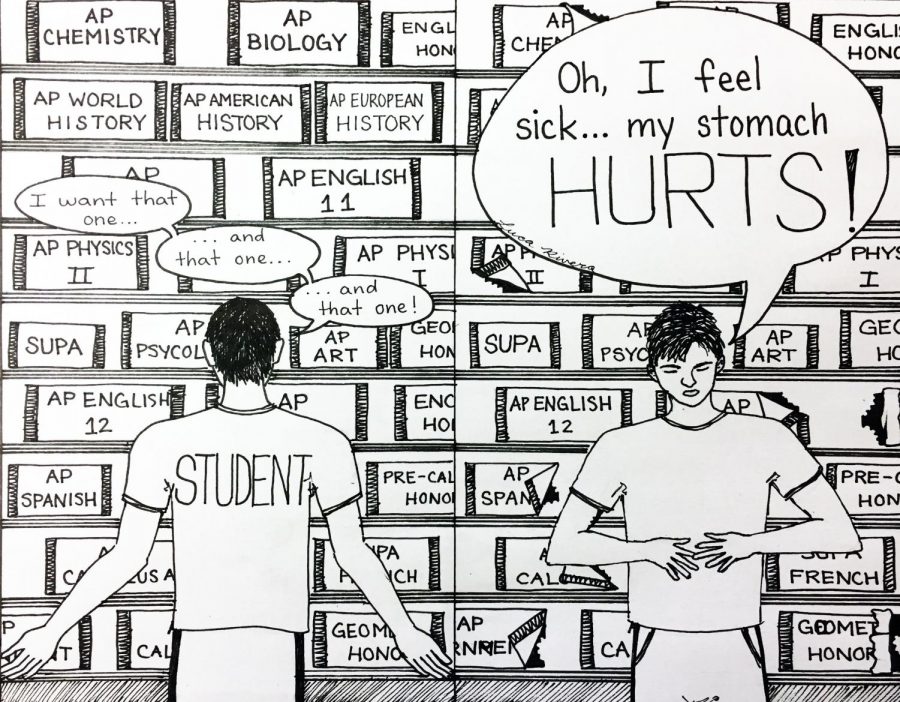Point/Counterpoint: Open Enrollment
March 16, 2018
Which do you want — the jelly donut or the one with the sprinkles? They both look tasty, and it’s nice to be given a choice. The jelly donut is sweeter, but it’s going to take a lot more work and pressure to burn off those calories. Now, consider this: what if you were told, “Sorry! You can only have that jelly donut if you maintain a ninety average and get two teachers to recommend you to eat that delicious pastry!” Well, that’s the way certain classes had been offered here at PMHS — access to AP level courses were based on academic achievement and the recommendation of teachers who felt you were mature enough to handle the rigors of a college preparatory class. That all changed two years ago, when PMHS made the decision to offer open enrollment to its students. Basically, anyone who wants to eat the jelly donut can eat it, even though they may not have the wherewithal to deal with the stress, pressure and rigor that goes beyond the initial gratification of getting the “donut” — or in this case, the AP class that will appear on your transcript. Some view this system as a good change since it offers more students a choice to enroll in more challenging classes. To use a different analogy, if one goes to a gym it is definitely dangerous to lift a 100 pound barbell before one has attempted to lift one that weighs 50 pounds. One might get hurt, and the disappointment of not succeeding as quickly as one had hoped could lead one never to return to the “gym” again.
Loading students with additional stress-inducers may cause them to become anxious at a time when the alarming statistics are already showing the toll stress is taking on young people. The American Psychological Association found that the stress level of the average teen, a high 5.8 out of 10, far exceeds what is considered a healthy level, a 3.9 out of 10. According to the National Institute of Mental Health, about 8 percent of today’s U.S. teens suffer from some type of diagnosed anxiety disorder. Stress can take great tolls on students’ health too. A study from the University of St. Andrews listed some potential symptoms as headaches, insomnia, and depression. Students that don’t have the necessary foundation in a subject may find themselves not only falling behind in class, but working up their anxiety trying to catch up. Further, a recent study in the journal Frontiers in Psychology notes that, “chronic stress has been cited as the new ‘cultural currency’ in highly competitive schools, where students often equate their schools’ level of rigor with the amount of stress experienced by its students.”
In spite of the pressure, some think that open enrollment provides challenges and goals. This is where context and perspective become key. If a student is determined to dip their toe in the water of college-level material to see how they might fare at college, to identify skills they still need to develop, or to attempt work that raises the bar on what they have been doing, perhaps one AP class, or two might be beneficial. But what about those who believe they must be in every AP class offered to be considered a viable college candidate? Does open enrollment serve them?
One way of dealing with anxiety may be examining the things we stress out about in a realistic way. Few people can be “Renaissance men… or women” — students who excel in all subjects and all things, modern day Leonardo da Vincis who are masters of art and architecture and math and science. So, why not focus on the things that do interest us, and take AP classes in just those areas? One can reduce the unnecessary stress of unrealistic goals — trying to be perfect, even in subjects that we don’t like very much.
Open enrollment is both a blessing and a curse — a source of opportunity or a potential source of stress. It’s the jelly donut that provides satisfaction when you eat just one, and the bellyache when you overdo it. Plato, the great Greek philosopher, said that moderation is a virtue, while Dante Aleghieri considered gluttony one of the seven deadly sins!




